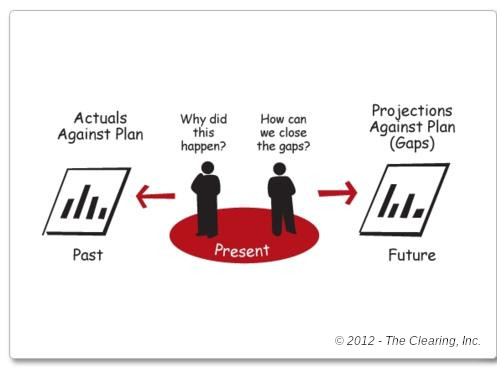Looking at past performance is important, but the past is over. Once the lessons of the past have been learned, dwelling on it absorbs valuable energy that could be better spent creating the future.
ISSUES FORWARD recognizes the fact that no matter how well you plan, reality often deals you new information and facts that require adjustments in order to meet your goals. Most leaders spend their time on performance reports, perhaps because a backward glance is attractive; information is available and confirmed. Projections against a future plan are speculative, but they’re much more valuable because there is still time to change them.
There are two questions for leaders to ask about the performance of their organizations or systems:
“Why did things go this way, compared with the plan?”
This question comes after a reviewing a performance report to evaluate what happened. It’s a reflective learning process. It’s also a valuable question and should be asked.
But a call to look at ISSUES FORWARD is even more valuable:
“What’s projected, what’s the plan now, and how do we close the gap?”
These questions are powerful and proactive.
Powerful leaders tend to have four words clearly defined:
- Plan: What we intend to make happen in the future.
- Projection: What we think is really going to happen, unless we do something different.
- Actual: Looking backward, what really happened?
- Re-forecast: When projections are far off from plan, a new number must be declared to re-establish healthy tension in the system. But never forget the original plan.
IN ACTION
ISSUES FORWARD leads to immediate, decisive action when leaders compare projections to the plan, see the gap and ask, “How do we close the gap?” When a leader is surprised by actual performance, it’s because he or she wasn’t looking ISSUES FORWARD.
SO WHAT?
Without an ISSUES FORWARD perspective, leaders will always be surprised by the future, and powerless to shape it.

